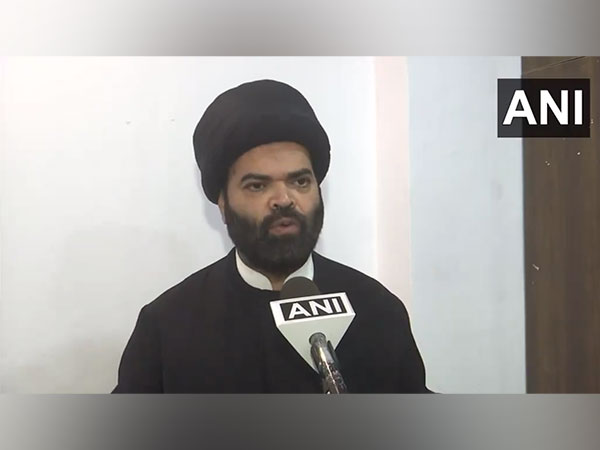"No one should have objection": National Olema Parliament General Secretary Kalbe Rushaid Rizvi on CAA
National Olema Parliament General Secretary Kalbe Rushaid Rizvi said on Thursday that the CAA notification is good news for those who have been living here for decades without documents and no one should have an objection to this.

- Country:
- India
National Olema Parliament General Secretary Kalbe Rushaid Rizvi said on Thursday that the CAA notification is good news for those who have been living here for decades without documents and no one should have an objection to this. "Whether it is a matter of India, Nepal, Bangladesh, Pakistan or Iran, any place where there are infiltrators with fake identities, the peace and security of that place is threatened. To avoid this, the Home Minister and the PM should know who is without documents and who is not. It is good news for those who have been living here for decades without documents... No one should have an objection to this... We, the Shia Community, believe that an oppressed is an oppressed... It is a good step that the HM, PM and the Foreign Ministry have decided to provide documents to them... It is an appreciable step." said National Olema Parliament General Secretary Kalbe Rushaid Rizvi.
"If a person living in this country for decades is genuine, then he can be given a passport... If someone has lived in this country for decades and his ancestors had a relation with our country, then why would he not be given citizenship?..." Kalbe Rushaid Rizvi added. Meanwhile, Indian Union Muslim League (IUML) leader PK Kunhalikutty has spoken out against the central government for promulgation of the rules of the Citizenship Amendment Act (CAA), 2019.
Speaking to ANI on Thursday, Kunhalikutty questioned the 'need' to implement such a law claiming that it is not welcomed by anyone. "Why should they implement a law that has not been welcomed by anyone in India? What is the need? Why are they taking a partisan stand in the matter of citizenship? There is no precedent of any such legislation elsewhere in the world. No one likes it. It is not welcomed by anyone. So why are they forcing it on people?" Kunhalikutty said.
"There are many states like Kerala, Tamil Nadu, and West Bengal that are against this law. We are with the Kerala government and will pass a resolution taking a stand against this law," he said. On March 11, after the Union Home Ministry notified the rules of the CAA, Kerala Chief Minister Pinarayi Vijayan declared that Kerala will not implement the Act.
"LDF government approached the Supreme Court to confirm that Kerala would not implement the Citizenship Amendment Act. Kerala is the first state to move a plea against CAA in the Supreme Court. The state will initiate further legal action soon," Vijayan said. On March 14, the Communist Party of India (CPI) Rajya Sabha MP and CPI Kerala State Secretary Binoy Viswam approached the Supreme Court challenging the implementation of the CAA.
"Provisions of the CAA are prima-facie against the secular tenets of our Constitution and we have approached the Supreme Court requesting to halt the implementation of the dreaded law, which goes against the inclusive fabric of Indian society", he said.Binoy Viswam in a statement said that the CPI has been steadfastly opposing CAA from the initial period itself. Apart from Kerala, Chief Ministers of West Bengal and Tamil Nadu have also announced that the CAA will not be implemented in their respective states.
On March 11, the Union Home Ministry notified the rules of the Citizenship Amendment Act (CAA), days ahead of the announcement of the Lok Sabha election schedule. The CAA rules, introduced by the Narendra Modi government and passed by Parliament in 2019, aim to confer Indian citizenship to persecuted non-Muslim migrants--including Hindus, Sikhs, Jains, Buddhists, Parsis, and Christians--who migrated from Bangladesh, Pakistan, and Afghanistan and arrived in India before December 31, 2014. (ANI)
(This story has not been edited by Devdiscourse staff and is auto-generated from a syndicated feed.)
ALSO READ
Foreign Secy Vinay Kwatra bolsters India-US relations on Washington visit
Foreign Secy Kwatra reviews advancements in India-US strategic partnership
Indian-Americans Bhatia, Theegala ensure weekend action, Woods sets cuts record at Augusta
Two former India hockey team captains in electoral battlefield in Odisha
New Zealand plans to celebrate centenary of 1926 Indian Army hockey team tour to NZ: Envoy










